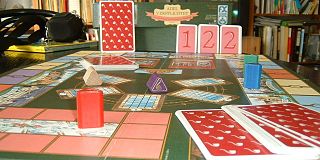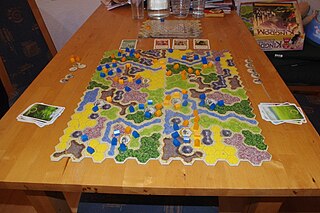Related Research Articles

Elfenland is a German-style board game designed by Alan R. Moon and published by Amigo Spiele in German and Rio Grande Games in English in 1998. Elfenland won the Spiel des Jahres award in 1998.

Reiner Knizia is a prolific German-style board game designer. He was born in West Germany in 1957 and earned a doctorate in Mathematics from the University of Ulm before designing games full time. He is frequently included on lists of the greatest game designers of all time. Many of his hundreds of designs are considered modern classics, and many have won or been nominated for significant gaming awards, including the Spiel des Jahres and the Deutscher Spiele Preis. His notable designs include Amun-Re, Blue Moon City, Ingenious, Keltis, Lord of the Rings, Medici, Modern Art, Ra, Taj Mahal, Tigris and Euphrates, and Through the Desert. Many of his designs incorporate mathematical principles, such as his repeated use of auction mechanics.

El Grande is a German-style board game for 2-5 players, designed by Wolfgang Kramer and Richard Ulrich, and published in 1995 by Hans im Glück in German, by Rio Grande Games in English, and by 999 Games in Dutch. The game board represents renaissance-era Spain where the nobility fight for control of the nine regions. El Grande was praised for its area-control mechanism, and was awarded the Spiel des Jahres prize and the Deutscher Spiele Preis in 1996. Following its release, several expansions and an alternative version were published.

Alhambra is a 2003 tile-based German-style board game designed by Dirk Henn. It was originally published in Germany by Queen Games in a language-interdependent version; an English-specific version was released in North America by the now-defunct Überplay. The game is a Muslim-themed update, set during the construction of the Alhambra palace in 14th century Granada, of the 1998 stock trading board game Stimmt So!, which in turn was an update of the 1992 mafia influence board game Al Capone; the original version was subsequently released as Alhambra: The Card Game. Upon its release, Alhambra won numerous awards, including the Spiel des Jahres award. Its success has led to the release of numerous expansion packs and spin-off games, and is becoming Queen Games' flagship franchise.

Wolfgang Kramer is a German board game designer.

Alan R. Moon is an author of board games, born in Southampton, England. He is generally considered to be one of the foremost designers of German-style board games. Many of his games can be seen as board game variations on the travelling salesman problem.

Hoity Toity is a board game created by Klaus Teuber in 1990.

Niagara is a German-style board game designed by Thomas Liesching and published in 2004 by Zoch Verlag and Rio Grande Games. In Niagara, which is set in the Niagara Falls, players collect, transport, and steal gems. Upon its release, the game won several awards, including the 2005 Spiel des Jahres.

Primordial Soup is a board game designed by Doris Matthäus & Frank Nestel and published by Z-Man Games. It was first published in 1997 in Germany by Doris & Frank under the name Ursuppe and this original version won 2nd prize in the 1998 Deutscher Spiele Preis.

Ingenious is the English name for Einfach Genial, a German abstract strategy board game designed by Reiner Knizia under commission from Sophisticated Games and published in 2004 by Kosmos. Across most of Europe it is titled as the local translation of Ingenious or Simply Ingenious, the notable exception being Mensa Connections in the UK.

Michael Kiesling is a German board game designer. Many of his games have been nominated for or have won the Spiel des Jahres, a German games award.

Agricola is a Euro-style board game created by Uwe Rosenberg. It is a worker placement game with a focus on resource management. In Agricola, players are farmers who sow, plow the fields, collect wood, build stables, buy animals, expand their farms and feed their families. After 14 rounds players calculate their score based on the size and prosperity of the household.
Michael Schacht is a German game designer, graphician and owner of the small publishing company Spiele aus Timbuktu.

Fresco is a 2010 designer board game by Marco Ruskowski and Marcel Süßelbeck. It was nominated for the 2010 Spiel des Jahres award and won the 2010 Deutscher Spiele Preis. Each player in Fresco takes the role of master painter attempting to restore the fresco on a cathedral ceiling, earning points for each section they repair. Players must manage a team of apprentices who will buy or mix the required paints, paint portraits to earn money, and keep the bishop happy. Overworked apprentices may leave the painter's service, reducing the actions the player can take. A player can improve morale, and even gain extra actions, by letting his workers sleep late. However, this can allow earlier players to block his ability to buy necessary paints or to restore a section of the fresco before he can get to it.
Hansa Teutonica is a German board game designed by Andreas Steding and published by Argentum Verlag in 2009. It placed in the top 10 at the Deutscher Spiele Preis.

Kingdom Builder is a strategy board game designed by Donald X. Vaccarino, published in 2011 by Queen Games with illustrations by Oliver Schlemmer in German, British and international versions.
Ark Nova is a strategic board game for up to four people. It was designed by game designer Mathias Wigge, and first published in 2021. In Ark Nova, players aim to score conservation and appeal points by building a zoo. Upon its release, Ark Nova received positive reviews and received several awards.
Cascadia is a 2021 board game designed by Randy Flynn and published by Flatout Games. In Cascadia, players draft and add habitat tokens and matching wildlife tokens to score victory points based on various scoring conditions. Upon its release, Cascadia received critical success, with reviewers praising its components, accessibility, and strategy, but also noting its lack of player interaction. Cascadia won the 2022 Spiel des Jahres and the 2023 International Gamers Award for the Best solo game.
Quacks & Co.: Quedlinburg Dash, also known as Quacks & Co., is a German children's racing game designed by Wolfgang Warsch and first published by Schmidt Spiele in 2022. It is a spin-off of the game The Quacks of Quedlinburg. Players take turns drawing coloured chips from a bag in order to move their animal along a racetrack and be the first to make it to Quedlinburg.